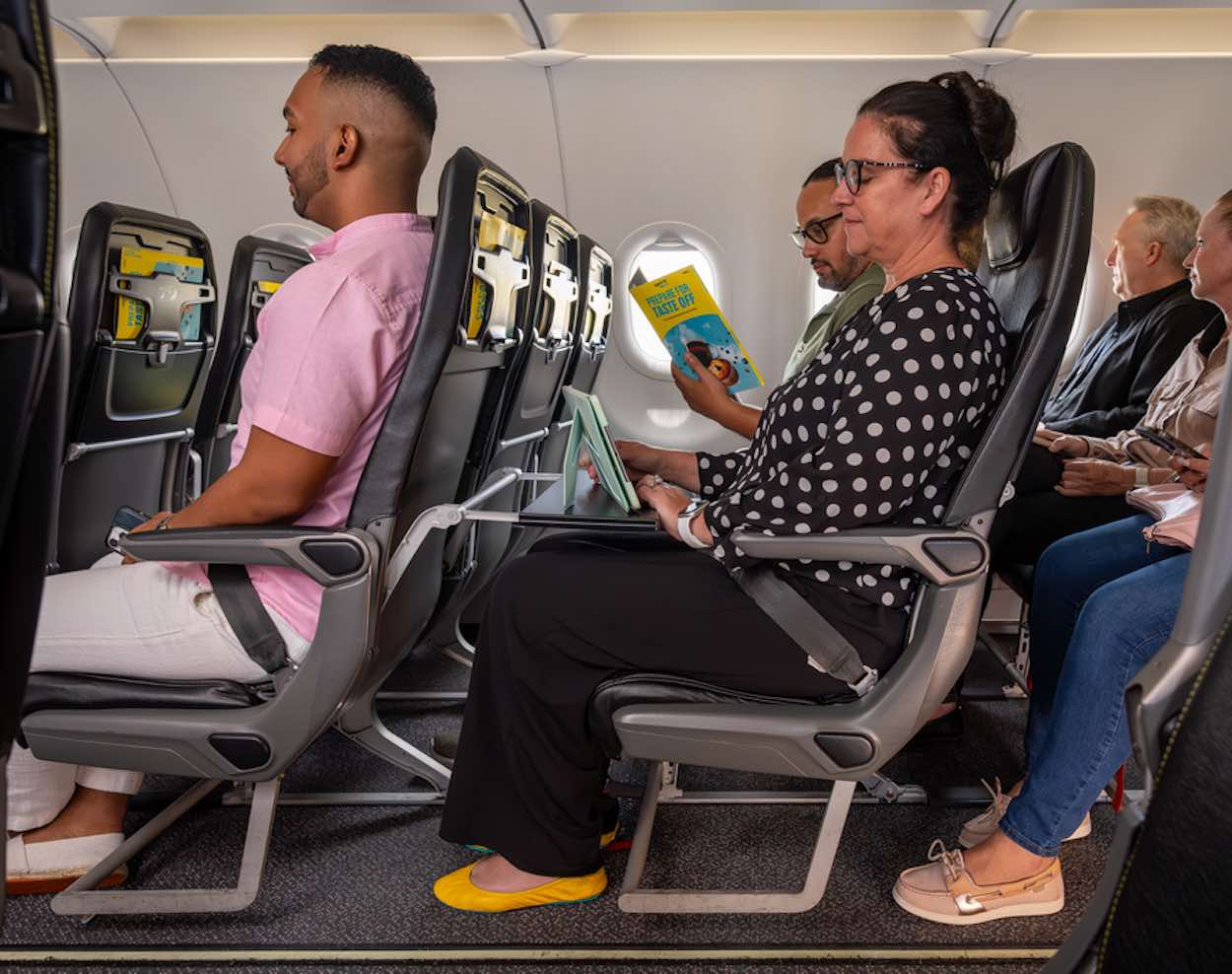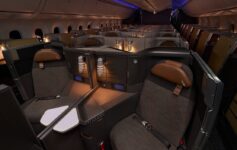
A long-winded article in Slate lamenting the proliferation of basic economy actually does a great job of showing why it is valuable as an airfare option.
Basic Economy Works Because Travelers Choose It
Slate published a piece by Alex Kirschner on the current state of airline tickets, focusing on the spread of basic economy tickets. The author is skeptical of basic economy, presenting it as restrictive and unfriendly to travelers. Yet the very examples the author uses demonstrate why the fare exists and why it remains popular.
“In late July, I prepared to fly with my then fiancée from Los Angeles to Charlotte for our wedding. It was a special flight en route to the biggest day of our lives. It was also my birthday. Unfortunately, I had committed one of the gravest sins of modern American air travel: I had bought us basic economy tickets.”
But that’s on you, buddy! American Airlines (and every other carrier) now makes the restrictions very clear when you buy a basic economy ticket. That’s because they do not want you to buy that ticket…they want to scare you into paying extra for a regular ticket with fewer restrictions.
Yes, basic economy removes things many travelers prefer, like early boarding, a guaranteed overhead bin spot, or seat selection. It also lowers the price (or at least keeps the price closer to what it has been despite inflation). When presented with that tradeoff, consumers regularly opt to save money.
What The Author Accidentally Proves
“Neither my fiancée nor I gave much thought to what this meant. For one, we would likely not sit next to each other on the American Airlines flight. A bummer, but whatever—we didn’t want to pay the extra $100 each for the privilege.”
Take that line and follow it to its logical conclusion. If a meaningful number of travelers knowingly forgo seat choice and flexibility because the fare is cheaper, then the product is doing its job. It gives price-sensitive flyers a real option and preserves a higher service tier for those who value extras.
“The problem is that we have played ourselves. By changing how we shop for flights, we have encouraged airlines to race one another to the bottom and to offer as few amenities as possible in the ticket classes that they market most widely. In fact, we’ve prompted these companies to make their offerings much worse, accepting each deterioration with a smile. The Google Flights–ification of flying has beaten back inflation in ticket pricing. It has also made flying less pleasant.”
Exactly. That is market segmentation, not trickery. Basic economy emerged to compete with ultra-low-cost carriers without collapsing the revenue integrity of standard economy. By keeping an entry price low, airlines can defend their network against bottom-of-the-market pricing while still offering better included features to customers who will pay a bit more.
Cost, Benefit, Choice
Basic economy is not ideal. It can be annoying, especially on longer flights or when you need flexibility. But it transparently presents a cost-benefit decision. If the savings are substantial, many passengers accept the limits and book it. If not, they buy up. The Slate article repeatedly returns to that dynamic.
“At first blush, this is a standard story of corporate greed. Easy pickings! But the question of what we should all want, as the flying public, is weirdly complicated. I know that this will sound strange if you have recently had an unpleasant flying experience, but we are living in an objectively great time to be nonrich people buying airline tickets. Non–business class tickets are only about $20 more expensive now than they were in 2000, according to the Bureau of Labor Statistics. (That link should return whenever the government reopens.) Inflationwise, we’re all making out like bandits.”
That is the ballgame. When consumers are offered a clear price difference for fewer inclusions, they often choose to save. Pretending this is a trap denies what the author’s own observations reveal. Travelers are not being duped. They are optimizing for their trip and their budget and coming out ahead.
Why Fares Stay Reasonable
There is also a network effect. Maintaining an entry level fare helps keep published prices competitive across markets. Without a basic tier, the legacy carriers would be forced to either match ultra low cost airlines with full service tickets or raise prices across the board. Neither is sustainable. Basic economy is the way forward.
“My wife and I don’t mind sitting apart on planes because we’re both thirtysomethings who want to do work or watch movies, but people who do care about sitting with their traveling party don’t get to enjoy the cursed miracle of basic economy.”
And they have a very clear option to avoid that: buy a regular economy class ticket. Even that is still cheaper than a decade ago when you adjust for inflation. Again and again, I repeat that consumers can decide where to spend or save.
CONCLUSION
Basic economy removes comfort and flexibility, and that is the point. It also removes dollars from the fare. The Slate article sets out to indict the product, but the author’s own words end up proving the case for it, over and over. When travelers see the price gap and still choose basic economy, the market is speaking. Airlines keep an accessible entry price. Consumers keep the ability to make a clear trade. That is not a flaw in the system. That is the system working.




Some are irritated because basic economy takes away some things that don’t cost the airline anything. Seat assignment is one of them. Maybe it costs the airline a fraction of a cent in electricity to power the website as people choose a seat?
What if basic economy had a lavatory use fee, boarding pass printing fee, ask a flight attendant a question fee, check the website too many times fee, flight status inquiry fee, etc.?
Good one, electricity is the only thing that matters… psh, are you a computer?
Anybody knowing even a little about economics will tell you that cost can is very important in pricing. Yet, often the price is higher for something that has zero costs. How ignorant of economics does one have to be not to see that?
How people do not see that this is a simple extension of what other companies do to segment their products is absolutely beyond me.
It’s quite simple. You can buy the last generation iPhone, you can buy the new “low end iPhone”, or you can get the iPhone Pro.
It would be like buying the last generation iPhone only to complain that it doesn’t have the latest camera features.
People complain that things “used to be free” on the airlines, and that they have benefited from several taxpayer funded bailouts. This is half true.
During the pandemic, the government used taxpayer funds to mostly bailout the workers and frontline employees to keep the nation al air system running. During 9/11, the corporations were bailed out. Labor was not and many workgroups made severe concessions to “help the airline out”. That was corporate greed.
In regular circumstances where there’s not an act of god that decimates the industry, we now have a stable and profitable airline industry that provides good, union jobs. Ancillary fees and things “no longer being free” contribute to that stability, because in the US airlines are non-crown corporations that seek to make profits for their shareholders, like any other corporation.
If you want Emirates, Qatar, or Riyadh air service – contact your representatives and request that they nationalize the airlines. Otherwise, stop whining.
Let’s all conveniently ignore the fact that airlines touted “basic economy” as an “unbundled” fare…while charging the EXACT SAME fare for basic as the old fare that included a free seat assignment, carry on bag, and maybe even a checked bag. So basic economy was nothing more than a fare INCREASE.
But yes, you’re correct on the premise of the article.
Yup, these are businesses, not charities… first time?
AA Basic economy for status holders is actually incredibly generous. As OWE I can select an exit row, get early boarding and miles too
Hopefully the fiancee left him for being tight-fistedly cheap.
Right?
In my view JetBlue is the most evil of all airlines offering Basic Economy because they don’t assign seats to Basic Economy customers until one hour before departure, thus effectively denying such passengers the opportunity to use credit card lounges. And yes, the Capital One lounge at JFK refused me access because I technically didn’t have a confirmed seat assignment, even though my “crime” was flying Basic Economy rather than being on standby. I did call JetBlue from the entrance to the lounge to beg them to assign me a seat (I was not ASKING to choose a specific seat), and they refused unless I paid the seat assignment fee. This is total BS in my view.
Is this true? I haven’t heard of this.
Of course it’s true. The JFK Capital One lounge manager on duty told me he sees the issue all the time with B6 basic economy tickets.
Wow, you flew jetBlue (T5), but attempted T4 lounges? Such dedication, yet you still failed. Wow. Your ‘crime’ was being too cheap. And, jetBlue’s only ‘failure’ is that they took 25 years to finally open their own lounge at T5.
Why is it a big deal? T5 and T4 are next to each other (one stop on the Airtrain) and I was really excited to try out the brand-new Capital One lounge at JFK. Plus with Precheck and CLEAR you can get through T4 security in less than a minute. There was very little opportunity cost to booking Basic since I have no status with B6 (I’m 1K with UA), but I learned thanks to this trip the opportunity cost is accessing a lounge.
Don’t Like Basic Economy? Don’t Buy It! I just came up with that. Really, I did.
Or the cheapest option. Don’t travel.
I’d like double-up on P’s point… PP.
I do wish that airline credit cards offered free seat choice on BE tickets along with the first checked bag, better boarding, etc slate that they typically do. Or at the very least let me chose on a flight if I want a free bag checked OR free seat assignment!
Yes, I also wish McDs gave me free fries, and all my grocery items were BOGO.
As @Gene says, ‘want first, buy first’… same goes for Basic vs. regular Economy or extra Economy.
My issue with Economy Minus is exactly what Steve said. The airlines gaslighted us about “unbundling”, but they simply took the old fare, stripped out all the perks, and changed the name to Basic Economy while charging the same price. The exact same thing you bought the day before was now magically $80 each way more expensive. Your point is taken on your overall criticism of the Slate article, though.
That reminds me of that Amazon series ‘Upload’ (2020). “Are you willing to fly ‘Economy Minus’? Welcome to Frontier-Spirit-United…”
Really? You think that after you read:
“Non–business class tickets are only about $20 more expensive now than they were in 2000, according to the Bureau of Labor Statistics.”
above?
If you just want to fly from point A to point B as cheaply as possible, basic economy may be right for you. Otherwise, give it up!
Dr. Güntürk Üstün
Your points around transparency and choice, much like the PR stuff that airlines come up with, are overly simplistic for frequent flyers and/or those who take complex itineraries.
Fancy an open jaw trip with AFKL? The website will only price up the light fare. Want to mix fare types on TAP? Even if you know the booking class letter, there’s no way of finding out how many miles you’ll earn in your A3 account in each category. Missed the inflexible basic economy on the outbound but have a flexible fare on the return? Prepare for an interminable argument around the flexibility you’ve paid extra for. Want to take advantage of your elite status to check a suitcase in on a Light fare? Even if you aren’t unlucky enough to encounter one of the airlines that exclude it (BA, LH, SN, AV, LX, NZ and I can’t see the list getting any shorter), getting miles credited to a different programme might result in being asked to pay extra at the gate (happened to me twice with AF). Don’t even think about trying to use the status benefit of advance seat reservation for a travelling companion on a different PNR on such a fare, that’s a recipe for wasting hours of your life arguing with confused call centre agents.
That’s not transparency, choice, or value. That’s a classic example of enshittification.
(posting again as the first time didn’t seem to work)
Your points around transparency and choice, much like the PR stuff that airlines come up with, are overly simplistic for frequent flyers and/or those who take complex itineraries.
Fancy an open jaw trip with AFKL? The website will only price up the light fare. Want to mix fare types on TAP? Even if you know the booking class letter, there’s no way of finding out how many miles you’ll earn in your A3 account in each category. Missed the inflexible basic economy on the outbound but have a flexible fare on the return? Prepare for an interminable argument around the flexibility you’ve paid extra for. Want to take advantage of your elite status to check a suitcase in on a Light fare? Even if you aren’t unlucky enough to encounter one of the airlines that exclude it (BA, LH, SN, AV, LX, NZ and I can’t see the list getting any shorter), getting miles credited to a different programme might result in being asked to pay extra at the gate (happened to me twice with AF). Don’t even think about trying to use the status benefit of advance seat reservation for a travelling companion on a different PNR on such a fare, that’s a recipe for wasting hours of your life arguing with confused call centre agents.
That’s not transparency, choice, or value. That’s a classic example of ensh!ttification and management incompetence.
Our wedding got off to a bad start. I basic economy’d us to Charlotte to save $180 and the airline wouldn’t allow us to sit together.
Basic economy for a wedding flight is wild.
This guys next story…….I was cocked and I kind of liked it.
Price discrimination is not “corporate greed” – it’s common sense economics.
Yes! And, wait for it, airlines don’t make a profit flying. We pay them less in airfares than it costs them to fly. So, yeah, they are scumbags for trying to maximize revenue.
Hey, Alex Kirschner, I ordered the kids meal to save money, and I was still hungry afterwards.
I don’t know why people who have little exposure to an industry get to write articles about it. To most frequent fliers, the fact that a self-proclaimed thirtysomething is flying economy across the country to their wedding would indicate they’re a very infrequent traveler. Lamenting some sort of loss of service or comfort in domestic air travel is a tired trope. I’m 40 and basic economy has existed in some form since my very late 20s, so for the writer, it’s likely every time they’ve bought a ticket in their adult life, there has been a basic economy element at play.
They’re lamenting an era that they have no recollection of.
The government should just mandate that airlines provide exactly the flight that I want to fly, on the schedule that I want to fly it, with seats that are comfortable and spacious (seated together with my entire family) for the price I am willing to pay. Why is that so hard?
The sad thing is some say that without sarcasm.
People forget how cheap it is to fly nowadays. In 1971 I flew from JFK to Amsterdam on a $200 round trip “student” fare, which was, I believe, 2/3 of the regular fare. That’s the same as $1600 in 2025.
According to Expedia the same itinerary today would cost $422. Granted, economy then is probably equivalent to premium economy now, but if you choose carefully, you can fly for about $1200.